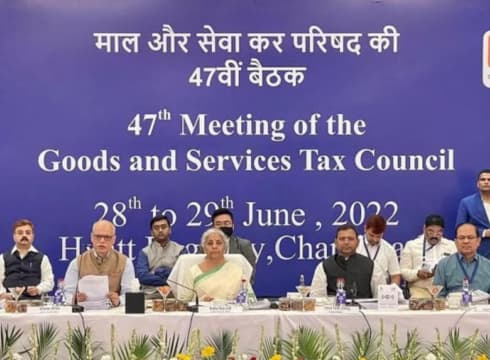According to the GST law, every ecommerce operator is required to collect TCS at 1% of the taxable value of goods or services sold through its platform
The confusion on the liability of the TCS deduction comes in the marketplace model, where two intermediaries are involved in a single transaction
Since there are several entities involved, the DPIIT has sought clarity as to whether the buyer or the seller would be required to deduct the TCS
Inc42 Daily Brief
Stay Ahead With Daily News & Analysis on India’s Tech & Startup Economy
The Goods and Services Tax (GST) Council is set to give more clarity on the suppliers’ tax collected at source (TCS) liability on the Open Network Digital Commerce (ONDC) on July 11. These are for cases where multiple operators are involved in a transaction.
Since the network is open, interoperable and has multiple entities working together, there is no clarity on who should be liable for TCS compliance under GST laws.
According to the GST law, every ecommerce operator is required to collect TCS at 1% of the taxable value of goods or services sold through its platform.
Per sources cited by an ET report, the Law Committee, comprising tax officers from the Centre and states, has recommended to the Council that in a situation where multiple ecommerce operators (ECOs) are involved in a single transaction through the ECO platform, the TCS compliance is to be done by the supplier-side, who finally releases the payment to the supplier.
ONDC operates in two models – the inventory model and the marketplace model. Under the inventory model, a buyer places an order with an ecommerce platform. Then, the buyer pays the supplier of the goods and services. Here, TCS is deducted by the ecommerce platform while making payments to the seller.
The confusion on the liability of the TCS deduction comes in the marketplace model, where two intermediaries are involved in a single transaction.
In terms of the marketplace model, a buyer places an order on an ecommerce platform (buyer app). The buyer app then sources it from another ecommerce entity (seller app) and the seller app then procures the goods/services required from the actual supplier.
Since there are several entities involved, the DPIIT has sought clarity from the GST Council as to whether the buyer or the seller would be required to deduct the TCS on ONDC. According to sources cited above, TCS would be required to be deducted by the seller in this case while making payment to the supplier.
It is prudent to mention that last year, the GST Council waived mandatory registration for suppliers to ecommerce platforms in case of intra-state supplies, given the annual turnover of the supplier is less than the GST registration threshold of INR 40 Lakh for goods and INR 20 Lakh for services. This provision will come into effect from October 1.
Launched in 2022, ONDC has since expanded to more than 235 cities across India. Currently, the network has over 40,000 sellers, of which nearly 18,000 operate from five major cities – Mumbai, Delhi NCR, Chennai, Hyderabad, and Kolkata. The network recently expanded its beta coverage to these cities.
{{#name}}{{name}}{{/name}}{{^name}}-{{/name}}
{{#description}}{{description}}...{{/description}}{{^description}}-{{/description}}
Note: We at Inc42 take our ethics very seriously. More information about it can be found here.


